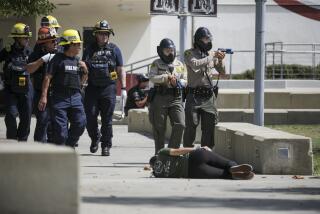California Journal: Domestic violence victims have no business carrying guns to school
- Share via
It’s tough for a gun owner to get a break in California.
And frankly, I feel pretty good about that.
Tuesday in Sacramento, an Assembly committee rejected a proposal that would have allowed victims of domestic violence to carry concealed weapons onto school campuses to protect themselves from their abusers. The bill would have carved out an exception to an important law, signed last year by Gov. Jerry Brown, that forbids gun owners from carrying legally concealed weapons or ammunition onto campuses unless they have express permission from school officials.
Join the conversation on Facebook >>
The proposed law would have allowed anyone with a restraining order against an accused stalker or abuser and a concealed weapon permit, to pack their pistols to school.
Such a law might make some domestic violence survivors feel empowered, but it is hard to see how public safety would be enhanced. In rural counties of California, where local law enforcement authorities are far more likely to approve applications for concealed weapons permits, thousands of people have the right to carry guns under their clothes. The last thing we need is more guns on school grounds and college campuses.
This place is pretty anti-gun for sure. But I was kind of hopeful to get some folks on the other side to come around to it.
— California GOP Assemblyman James Gallagher, author of a bill that would have allowed domestic violence victims to carry guns to school
The main pro-gun witness at Tuesday’s committee hearing, Brandi Shurtz-Huffmaster, a 43-year-old dog breeder from Yuba City, told a compelling story about being followed out to her car in the parking lot of a Target store by a man who brandished a stun gun at her. She pretended she had a hand gun in her pocket and charged at him, yelling, “I will kill you!” The man ran away.
“Things could have ended very differently for me,” she told members of the Assembly’s Public Safety Committee. After her parking lot encounter, she learned to fire a gun, obtained a permit to carry a concealed weapon from the local sheriff, and frankly, sounds like a model gun owner. A mother of four children, she told me that her gun is kept in her home safe, and is never accessible to her kids.
She was very sympathetic, but I thought her story was off point.
Instead of making a persuasive argument for bringing guns to school, I told her, she made a great case for self-defense training.
She thinks both are important. “I carry my gun all the time now,” she said. “As a woman, it really does give you a sense of security. If you have a domestic violence situation and a man knows a woman is somewhere where she can’t carry her gun, she’s a sitting duck.” (This is not an issue for her; she is happily married.)
I thought maybe the law was being pushed by the eternally energetic National Rifle Assn. to chip away at SB 707, the gun-limiting law Brown signed last year. But Assemblyman James Gallagher, the Yuba City Republican who proposed the exception, told me he was acting at no one’s else’s behest.
Gallagher said he simply thought there ought to be some sort of exemption for gun-carrying people whose safety is truly threatened.
“We have domestic violence victims who are students on college campuses, parents taking their kids to school, teachers,” he said. “It would seem to me that in those very limited circumstances, they should be able to carry if that’s what they want to do, and it should not be left up to school administrators.”
But as John Lovell of the California College and University Police Chiefs Assn. pointed out, “active shooter” incidents take place disproportionately on school campuses. Why encourage more weapons in places already besieged by gun violence? His group sponsored last year’s law keeping people with concealed weapons away from campuses and schoolyards.
“This bill will undermine the achievement of last year,” Lovell said. In California, he noted, many restraining orders -- especially in domestic violence cases -- are mutual.
Not surprisingly, no domestic violence prevention groups came out in support.
“Their policies are that people are at greater risk when they arm themselves for protection,” said Amanda Wilcox of the Brady Campaign to Prevent Gun Violence, and a former school board member in rural Nevada County.
The bill went down on a 4-2 vote. “This place is pretty anti-gun for sure,” Gallagher said, “but I was kind of hopeful to get some folks on the other side to come around to it.”
He actually did. One Democrat, Assemblywoman Patty Lopez of Sun Valley, joined a lone Republican on the panel to vote in favor.
“I was a little surprised by that,” Shurtz-Huffmaster said. “But I was looking at her while I was speaking, and I could tell she was taking it to heart.”
Thankfully, everyone else was using their heads.
Twitter: @AbcarianLAT
More to Read
Sign up for Essential California
The most important California stories and recommendations in your inbox every morning.
You may occasionally receive promotional content from the Los Angeles Times.











